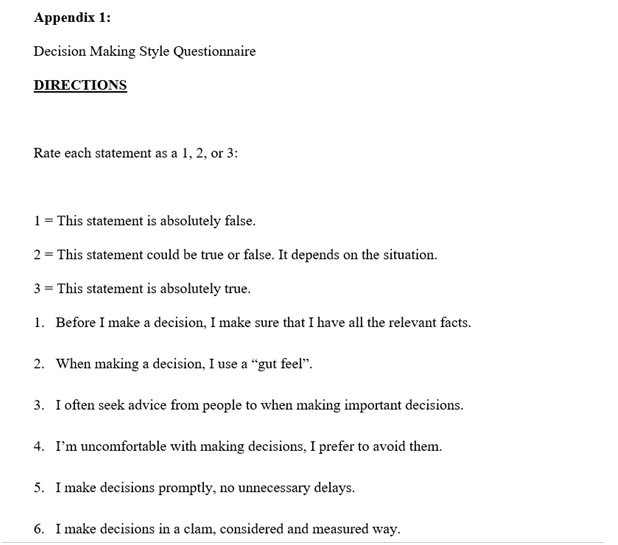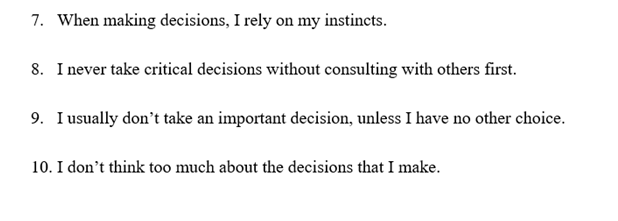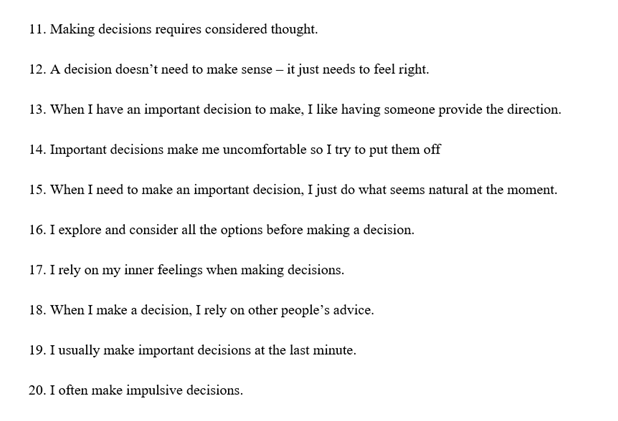Reflective Essay: Insights Gained from Learning Experience
Question
Task: Write a reflective essay addressing the topics namely critical thinking, decision making tools, self-awareness and evaluating arguments and reasoning.Reflect on these concepts/theories’ potential impact on students’ decision making, and how this learning is being applied and could be applied in their current jobs, development of future career and/or their life generally. Students will also complete at least 2 diagnostic tools related to learning styles and critical thinking and reflect be these results.
Answer
Introduction
The concept of reflective learning explored in this reflective essay is a process where the student reflects upon their learning experience. Reflective learning helps students to identify their strengths and weaknesses in the learning process. The present essay task focuses on the identification of the different topics learned in the weeks and making reflections about the topics. Evaluation of the impact of theories and concepts learnt from the weeks using tools are also discussed in this task. New insights gained from the learning experience and self-development plan are also discussed in this task.
Concepts learned from weeks.
Topic 1: Critical thinking
Convincing
Critical thinking is actually an intellectually disciplined method of applying, conceptualizing, evaluating and synthesizing all the information gathered, observed and reflected as a guide of options (Lau & Joe, 2011). Critical thinking defines the formation of an opinion or making a judgement to reach a specific decision.
Personal justification
I think critical thinking is necessary as it involves rational evaluation of the thinking process. As per my experience, I have identified that critical thinking helps in understanding the situation appropriately. It helps in making wise decisions and reaching the exact conclusion regarding a situation. Mistake avoidance and opportunity recognition become advantageous with the help of the critical thinking process.
Topic 2: Decision-making tools
Convincing
In order to support decision making, different forms of tools are used in the decision-making process. There are mainly three most important methods available that are used by managers in organizational areas to make decisions. As mentioned by Davies (2011), Benjamin Franklin, brainstorming and mind mapping, and fishbone diagrams are the primary tools used in the managerial decision-making process.
Personal justification
I think the K-T methodology is the most common form of the process used in the managerial decision-making process. Benjamin Franklin method helps in evaluating large numbers of information at a very small period of time (Bazerman& Moore, 2013). On the other hand, mind mapping brainstorming helps in the facilitation of the selection of alternative solutions to specific problems.
Topic 3: Self-awareness
Convincing
Self-awareness is the most important and advanced managerial leadership model. The self-awareness itself acts as the input-based competency approaches for taking and making proper decisions against certain issues of problematic situations (De Waal, 2019). Self-awareness is necessary for boosting self-development and making better decisions.
Personal justification
I have learnt that there are several tools available to identify the awareness of an individual. The Johari Window is the most common form of self-awareness tool used by professionals. I have identified that self-awareness is strongly associated with behaviour, personality, perception and attitudes. I think self-awareness also determines the emotional intelligence of people and helps them to make wise decisions towards certain unwanted negative circumstances.
Topic 4: Evaluating arguments and reasoning
Convincing
Arguments and reasoning are a necessary part of the managerial decision-making process. According to Mintzberg, managerial roles are of three types, namely informational, interpersonal and decisional. Certain forms of conceptual skill are required by managers to manage the working environment and make wise decisions (Glassner, 2017). Communication skill, negotiation skill, influencing skill and embracing leadership are common to implement suitable decisions in the working areas.
Personal justification
I learned that argument is the statement backed by evidence, where two or more numbers of people interact with each other. Arguments have two most important parts, namely the premise and conclusion (Cottrell, 2017). On the other hand, the reasoning is the process in which thinking is made in the form of a conclusion. I think the reasoning is the ability of people to think in a logical and wise manner.
Impact of theories and concept using decision-making tools
With the help of the tool, the overall impact of thetheories and concepts upon the decision-making process can be identified. It has been identified that Decision complexity and problem-solving are interrelated to each other in the managerial area to make wise decisions against a specific problem (Argyris, 2008). Decision making is a vital journey, while problem-solving is a vital part that has helped me to become a successful Housekeeping Manager at Gian Hospitality. Problems are mainly three types, namely crisis, opportunity and non-crisis.
The application of two tools are as follows:
Decision-making questionnaire
Decision making questionnaires are really helpful to identify personal decision-making capabilities (Bayram&Aydemir, 2017). This questionnaire was developed by Scott and Bruce in 1995 to identify the personal decision-making styles of individuals. I have applied this tool to identify my personal decision-making style in the concerned areas. As per the questionnaire, I have identified that I am a systematic decision-maker as I think wisely and slowly so that I can take proper decisions regarding this aspect [Refer to appendix 1]. I carefully examine all the factors before implementing all areas of the alternatives. It helps me to identify problems and ticking creatively to reach the ultimate solutions. As a Housekeeping Manager at GianHospitality, it is necessary for me to understand the needs and requirements of my customers as well as peers. The systematic decision-making process would allow me to manage different forms of internal as well as external issues faced by my organization in future.
Vac perception system quiz
Vac perception system quiz helps in the identification of the personal decision-making process used by students in their educational career (Atmadjati, Kristanto&Panuluh, 2020). I have applied this tool to identify the overall impact of the theories and concepts upon the decision-making process. As per the VAC learning styles model, most people hold three common forms of learning styles, namely auditory, visual and experiential (Scott & Bruce, 1995). From this system quiz, I have identified that I have an auditory learning style [Refer to Appendix 2]. This type of learning style has also helped me to gather knowledge about the management of people in my hospitality organization area.
I believe in gathering information by listening and speaking about the matter with others. Without evidence, I don't believe the fact that made me a good decision-maker. It is necessary to state that the auditory learning style has helped me to evaluate the issue faced by Gian Hospitality in terms of cross-cultural issues. With the application of the auditory learning style and systematic decision-making model, and conflict resolution skill, I was able to manage the issue faced by peers regarding the cross-cultural communication problem.
New insights gained and self-development
Lots of the experience I have gained from the week's learning process. As mentioned by Marchauet al. (2019), decision making is important to manage any issues in the organizational area. I have learnt from the week about different decision-making processes. Reasoning and argument are necessary for making effective decisions in organizational areas. As mentioned by Cook, Sherbino&Durning (2018), reasoning helps in avoiding error before its occurrence. All the areas have helped me to manage my role in the hospitality areas. I have also identified from the learning weeks that becoming effective leaders or professionals in the working area requires a certain form of skill. Communication, time management, critical thinking and wise decision making are necessary to manage and handle different types of conflicting citations as well. With the aid of effective critical thinking skill and conflict resolution skill, I have identified the root cause of conflict between the team members within my organization.
From the overall learning experience, I have identified that there is a strong need for the improvement of certain areas that can help me to become a successful professional in future as well. I think decision making is a complex process, while problem-solving acts as the action by which complexity is reduced. The areas that need improvement are as follows:
|
Area of improvement |
Activities required |
Time required to achieve |
|
Self-awareness |
Controlling negative emission is necessary to increase self-awareness (Atmajatiet al. 2020) Reflection in the personal emotional intelligence system |
1 to 2 weeks |
|
Critical thinking |
Retaining books, newspapers for gaining knowledge about the way thinking can be made critical (Elder & Paul, 2020) Dealing with the biases is necessary for critical thinking |
2 to 3 weeks |
|
Time management |
Splitting big tasks into smaller ones (Glassner, 2017) Complete task as early as possible by prioritizing the easiest one |
3 to 4 weeks |
Table 1: Self-development plan
(Source: Developed by author)
Conclusion
From the overall discussion, it can be concluded that critical thinking and decision making are the two most important that help to become successful in professional areas. Problem-solving consists of the six most important stages, namely problem identification, generation of the solution, evaluation of alternatives, implementation, planning and action. I have learnt that seven-step approaches are commonly used in the managerial area for managing problems and making wise decisions. Though I have self-awareness and effective decision-making skills, I have still identified certain areas that I need improvement in future. In the future, I need to improve my time management, critical thinking and self-awareness. I am a systematic decision-maker that takes lots of time to make decisions. Hence, I need improvement in time management so that wise decision can be taken in shorter periods of time.
Reference list
Argyris, C. (2008). “Resistance to Rational Management Systems” in Decision Making in a Changing World.
New: York: Auerbach Publishers, 1971, pp. 13-26.https://link.springer.com
/chapter/10.1007/978-3-540-48713-5_1
Atmajati, E. D., Kristanto, Y. D., &Panuluh, A. H. (2020).Student Perception of Online Quizzes and Interview Pretest Implementation in Pre-Practicum Activity.
In Companion Proceedings of the 7th South East Asia Design Research International Conference (SEADRIC 2019) (pp. 150-154). Sanata Dharma University Press, Yogyakarta. https://www.usd.ac.id/seminar/seadr/seadric-2019-companion-proceedings/atmajati/ Bayram, N., &Aydemir, M. (2017).Decision-making styles and personality traits. Int J Recent Adv Organ BehavDecisSci, 3, 905-915.http://globalbizresearch.org/Vietnam_Conference_August_2017_3/docs/doc/5.%20Management/VM714.pdf
Bazerman, M.H. & Moore, D.A. (2013) Judgment in Managerial Decision Making (8th ed). Wiley, USA.https://www.wiley.com/en-us/Judgment+in+Managerial+Decision+Making%2C+8th+Edition-p-9781118065709
Cook, D. A., Sherbino, J., &Durning, S. J. (2018). Management reasoning: beyond the diagnosis. Jama, 319(22), 2267-2268.https://jamanetwork.com/journals/jama/fullarticle/2681495
Cottrell, S. (2017). Critical thinking skills: Effective analysis, argument and reflection. Macmillan International Higher Education.http://icosmos.ncom.tw/upload/201907/156257893845888.pdf
Davies, M, (2011). Concept mapping, mind mapping and argument mapping: what are the differences and do they matter?, Higher Education Vol.62, pp.279-301. https://link.springer.com/article/10.1007/s10734-010-9387-6
de Waal, F. B. (2019). Fish, mirrors, and a gradualist perspective on self-awareness. PLoS Biology, 17(2), e3000112.https://journals.plos.org/plosbiology/article?id=10.1371/journal.pbio.3000112
Elder, L., & Paul, R. (2020). Critical thinking: Learn the tools the best thinkers use. Foundation for Critical Thinking.https://rowman.com/ISBN/9781538139516/Critical-Thinking-Learn-the-Tools-the-Best-Thinkers-Use-Concise-Edition Glassner, A. (2017). Evaluating arguments in instruction: Theoretical and practical directions. Thinking Skills and Creativity, 24, 95-103.https://www.sciencedirect.com/science/article/abs/pii/S1871187117300354
Lau, Joe Y. (2011) An introduction to critical thinking and creativity: Think more, think better. John Wiley & Sons, NY.https://www.academia.edu/830258/An_Introduction_to_Critical_Thinking_and_Creativity_ Think_More_Think_Better Marchau, V. A., Walker, W. E., Bloemen, P. J., & Popper, S. W. (2019). Decision making under deep uncertainty: from theory to practice (p. 405). Springer Nature.https://www.springer.com/gp/book/9783030052515
Scott, S. G. & Bruce, R. A. (1995). Decision-making style: The development and assessment of a new measure. Educational and Psychological Measurement, 55(5), 818–831.https://psycnet.apa.org/record/1996-93473-001
Appendix















